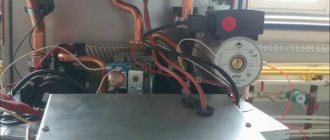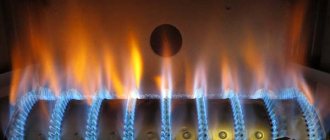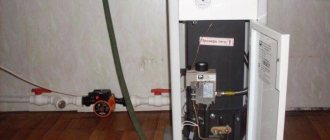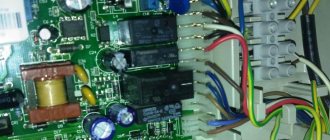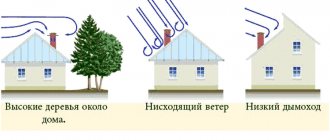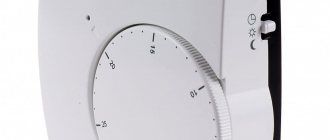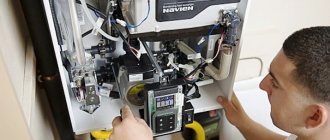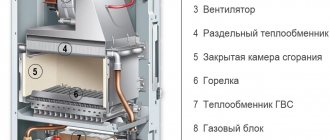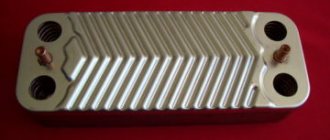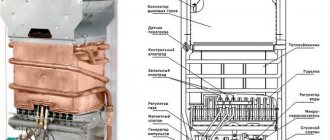The prospect of being left without heat in the cool autumn and frosty winter period will not please anyone. If this happens, then in the best case, the room can return to a comfortable temperature within a few hours. After all, it takes time for the master to arrive when called.
To quickly resolve the problem, it would be a good idea to learn how to identify and eliminate the cause of operational irregularities yourself. You need to figure out why the gas boiler goes out and try to get rid of at least basic faults yourself. We'll tell you how to find them.
Of course, no one forces you to dismantle equipment or change a part yourself if you have neither the tools nor the training to do so. However, information about simple and affordable repair operations will come in handy. In addition, they will help monitor the actions of gas workers, not all of whom are quite experienced and competent.
How to distinguish the norm from the problem?
If your boiler turns off briefly from time to time while working, this is a normal phenomenon; this is how an automatic system works, protecting the equipment from overheating and you from overpaying for bills for housing and communal services. The heat exchanger heats up periodically, heating the water to the set temperature.
But in the case when the boiler, after working for several minutes, immediately turns off without completing its direct task of heating, this indicates a malfunction. This is called a short cycle, which is dangerous not only due to insufficient heating of the room, but also large gas bills, and in the long term this malfunction will lead to serious damage to the boiler, which will require expensive repairs or even its complete replacement.
This is why it is important to take appropriate action as soon as you notice that your boiler has started to short cycle.
What is short cycle mode?
When your heating system doesn't need to be turned on, the heated water in the heat exchanger will naturally cool as heat escapes through the flue and around the boiler body itself.
The boiler has its own internal thermostat. When the boiler cycles briefly, this internal thermostat detects that the water in the heat exchanger is cooling and, although the temperature in your home has not dropped, starts the boiler to heat the water again. It doesn't take long for the heat exchanger to heat this small amount of water back up to the thermostat temperature, so the boiler quickly turns off again.
If the boiler is burning every few minutes, it is using gas but not heating your home. This wastes fuel which will increase your heating bills and carbon emissions, which in turn can cause damage to the heat exchanger as it is overworked.
If a heat exchanger malfunctions, it usually costs more than thirty thousand rubles (depending on the boiler model) without taking into account the labor costs of a gas safety engineer. Therefore, it is much more advisable to take appropriate measures before a major breakdown occurs at a time when replacing a faulty part does not become an expensive and time-consuming process.
The main reasons for the attenuation of gas energy-dependent and mechanical units
What type of boiler do you have?
- Volatile (automation runs on mains power).
- Mechanical (independent of electricity).
Why does the gas boiler go out? The reasons for their breakdowns may be different.
2-circuit non-volatile boiler
Volatile boilers have a more complex design. They may turn off when:
- lack of electricity;
- voltage drops and surges in the network;
- incorrect factory settings that need to be adjusted;
- The remote control, if there is one, may malfunction.
If there are problems with electricity in your area, it is better to purchase and install a voltage stabilizer in advance. And if you are just going to buy a boiler and are studying this issue, opt for a mechanical unit.
Mechanical boilers can go out due to strong gusty winds blowing into the chimney.
The most common reasons for disconnection
There are a lot of reasons why a boiler goes out, which only a specialist can figure out, but there are a number of the most common problems that you can identify yourself. Next, experts have selected for you the top 6 reasons that may indicate the original source of the problem of a non-working boiler.
Gas valve
One of the most common problems faced by owners of gas boilers of various models, including expensive ones, is a malfunction of the gas valve.
The gas valve controls the gas supply to your boiler. When more heat is required, the valve opens to provide more fuel, and vice versa when the water reaches a certain temperature.
However, the following problems may occur with the gas valve:
- Blockage;
- Lack of traction;
- Damage to wires or other components.
Of course, it is ideal to seek help from a professional, but if this is not possible and you are sure that the problem of a non-working boiler lies in the gas valve, then 99% of a hundred the reason lies in incorrect adjustment.
When the gas valve is not properly adjusted, it will block when too much gas is supplied (because it is dangerous) or too little gas is supplied (because the boiler circuit board recognizes the problem of insufficient gas supply).
Blocked burner
Like internal combustion engines in cars, a boiler produces carbon as it burns gas. This gas can clog the burner as a result of combustion, and ultimately lead to inconsistent, inefficient and incorrect operation of the equipment, which can cause the boiler to fail to supply hot water and heating.
Expert opinion
Torsunov Pavel Maksimovich
If the burner is not damaged, cleaning the carbon buildup will eliminate the problem. If the burner is in poor condition, you may want to consider replacing it.
The problem with replacing burners is that they are not cheap. The exception is older boiler models, components for which can be found at an affordable price in any gas equipment store.
Lack of gas or insufficient gas pressure
Along with malfunctions of boiler components, a fairly common problem that affects the correct operation of heating equipment is insufficient gas pressure.
It is necessary to contact a gas engineer to check the gas pressure in the pipes coming in:
- To your gas meter;
- From your gas meter;
- To your boiler.
Checking the pressure will help determine if there is a problem with the gas supply and where the problem lies.
Like faulty gas valves that produce too much or too little gas, the boiler will lock up and display a fault code when there is insufficient gas pressure.
If your boiler refuses to ignite only in cold weather, it is possible that the problem lies in the gas meter.
Gas meters have a regulator, which can freeze at low temperatures. The solution here is to protect the meter and therefore the regulators from the cold.
Problems with the electrode and ignition terminal
The ignition electrode and wire may be the problem if your boiler won't light and you hear clicking or ticking sounds.
Problems associated with gas create intermittent operation of the boiler, or rather, it lights up and immediately turns off. However, without a functioning ignition wire and electrode, the boiler will not light at all. The condition of the electrode and ignition wire can be checked using a multimeter. If the problem is with any of these parts, it is much cheaper to replace them rather than repair them.
The fan does not rotate
When hot water or heating is required, the first thing to do is run the fan. The fan in the boiler does not cool the boiler, but it helps create air movement and draft. This draft pushes harmful gases from the boiler into the chimney, due to which the harmful gases escape without entering the house.
If the boiler circuit board does not recognize the operation of the fan, the boiler does not light up, but is blocked. This function allows you to prevent the release of harmful gases into the room that can lead to severe poisoning. Moreover, without blocking, prolonged ignition of the boiler due to gas emissions could lead to an explosion. In addition, blocking helps prevent further equipment damage.
So, if your boiler does not ignite and, at the same time, you do not hear the fan running, this may be where the problem lies.
Expert opinion
Torsunov Pavel Maksimovich
Fans can be expensive, so where possible it is better to have them repaired, such as installing a new motor, rather than replacing the entire unit.
The indicator light has gone out
If your boiler's pilot light goes out, the cause is usually debris blocking the gas flow. The light bulb's jet motor is miniature in size, so even a small amount of dirt can block it, causing the warning light to go out. This is why the boiler does not light up.
We hasten to reassure you: injectors are cheap to replace, and their removal, cleaning and installation does not take much time.
Problems with closed-type turbocharged equipment
Sometimes when installing a new chimneyless apparatus, the flame periodically goes out. In this case, you need to check the components and parts. The problem is detected by the following factors:
- ignition of the igniter is accompanied by periodic attenuation - this indicates a failure of the thermocouple, which affects the operation of the valve. It is produced in the form of a copper tube with a bimetallic piece at the end. When different metals come into contact, the voltage increases to 20-45 W. This problem keeps the gas valve open. The thermocouple must be replaced with a new one; it cannot be repaired;
The draft sensor is located at the outlet of combustion products
- breakdown or clogging of the traction sensor - the flat part is combined with the fuel valve. When the leading contacts are closed and the burner is ignited, a fire occurs - this indicates the need to replace the sensor. Oxidized areas of contacts can be cleaned with sandpaper with fine abrasives;
- if the circulation pump malfunctions, it is necessary to carry out a complete diagnosis of the unit and replace it;
- A yellow flame is due to the fact that the jet is clogged. You can clean it if you have experience working with gas appliances.
Most of the reasons can be eliminated with your own hands, however, this will require some knowledge and a lot of time.
What else can cause an ignition failure?
Less common, but the following problems may occur that lead to blocking of the heating unit.
Short circuit
Another cause of failure may be a short circuit. This often happens when the boiler is chosen incorrectly; it does not fit the dimensions of the house (too small and its power is not enough to heat the room, or, on the contrary, too large).
Component mismatch
If the boiler has already been repaired and elements that are not suitable for the model are installed in it, for example, an air pressure switch, the boiler may see a signal unusual for its operation and therefore is blocked.
Inconsistency with the dimensions of the heating system
Boilers should be selected according to the size of your home's heating system and your likely demand for hot water. If the boiler is too powerful, it will produce more steam than it can condense, causing a short cycle. In the past, engineers typically installed boilers that were larger than required to compensate for high losses. Boilers today are much more efficient, so there is no need to overload the boiler.
Pressure too high
Too much boiler pressure will also cause the boiler's automatic safety precautions to kick in and shut down the boiler.
As a rule, the pressure in the boiler should be between 1 and 2 bar. If reducing the pressure doesn't make any difference, try bleeding the radiators with excess air and water before calling a gas safety engineer. How do you solve the problem of boiler attenuation?
On your own Call a specialist
Ventilation holes are faulty
All components in a gas boiler are important, and a malfunction of one will certainly lead to a blockage of the entire unit. In particular, ventilation is of particular importance for the correct operation of the boiler. If the vents are not working properly, air will be trapped in the system, increasing the pressure until the burner switches off at pressuretrol. They may need to be cleaned or replaced.
Thermostat is faulty or incorrectly calibrated
The thermostat may be faulty or in a cold draft, affecting its ability to accurately measure the monitor's temperature. Therefore, it is unacceptable for the unit to remain in a cold room for a long time. If the thermostat has a mercury switch and is not leveled, this can also cause the problem.
Boiler is the right size, but overheated
When a boiler overheats, it will produce a lot of steam in a short period of time, which will increase the pressure in the unit and cause it to shut down for safety reasons.
Malfunctions of electrical and gas equipment
Electric gas models need to be checked for voltage; to do this, just turn the plug over when inserting it into the socket to change the phase. In such devices, the main signs of failure are:
- There is no indicator light warning.
- No ignition when LEDs and operating display are on.
- The burner goes out after ignition.
The first step is to inspect the safety block. If the element burns out, a new fuse is installed. If this procedure does not help, you need to proceed to further study of the system:
- Cleaning the filter is carried out after completely turning off the device and closing the valves. The filter part is washed under running water and installed in place;
- If an air lock or excess fluid is detected in the pump, the main central screw is unscrewed, the air is released and the rotor of the device is turned with a screwdriver. After complete drying, the parts are installed back;
- low pressure in the system is eliminated by pumping the air mass into the area of the expansion tank located inside the structure. The pressure should be 0.2 bar lower than in the system itself.
These recommendations allow you to eliminate minor causes of breakdowns yourself without the help of professionals.
How to fix a boiler that is running in short cycle mode
We strongly advise against repairing the boiler yourself. Repairs and replacements of gas equipment must be carried out by an engineer.
Sometimes boiler repairs don't make financial sense. Instead, replacing the unit can be a much more cost-effective solution.
As boilers age, they become less reliable and require repairs more often. Those boiler repair bills will start to add up, and there will come a point where boiler replacement becomes your best option.
Depending on the type of boiler being installed, the cost of repairs can vary from thirty to sixty thousand rubles, including installation. Considering that some spare parts can cost between RUB 5,000 and RUB 10,000, this long-term investment in a boiler replacement may be the smartest move.
Expert opinion
Torsunov Pavel Maksimovich
You should consider replacing your boiler if your boiler is over 8 years old, breaks down regularly, engineers are having trouble finding replacement parts, or your gas consumption figures are rising.
Modern boilers are much more reliable than old units and come with a warranty period. The warranty will eliminate additional costs if the unit unexpectedly breaks down, and the new boiler will improve the efficiency of your heating system, which will help reduce your heating bills.
Lack of air for gas combustion
Problem related to lack of traction. Even if the boiler and chimney are in order, the lack of fresh air entering the combustion chamber of the burner can lead to the flame extinguishing.
From our school physics course we know that combustion requires oxygen. The powerful flame of the burner quickly burns it out of the air, turning it into carbon dioxide. If very little new air enters, the combustion stops, the flame subsides, and the automation turns off the gas supply.
Question answer
If the boiler is not purchased according to the dimensions of the heating system, could this affect its further operation?
Yes. It is very important to purchase a boiler with full consideration of the size of the room for heating and the heating system, because either a too small or an overly powerful unit, due to a mismatch in size and power, will begin to work incorrectly, which will subsequently lead to breakdown.
If a gas boiler turns off after working for several minutes and then starts again, is this normal or a sign of a malfunction?
This is a sign that the boiler is running in short cycle mode, which, in turn, indicates a malfunction. It is urgent to take measures to eliminate it, because, on the one hand, your gas bills will increase significantly, on the other, operating the unit in a short cycle will soon lead to a complete breakdown of the boiler.
Can insufficient gas pressure affect the operation of the boiler?
Directly. You can check the pressure using a multimeter, and it is better to have a gas engineer carry out this work.
The boiler does not turn on and, at the same time, no operating sounds are heard. What could be the problem?
If you can’t hear the fans working, most likely the problem is with them. If the fan malfunctions, the boiler is automatically blocked to prevent the release of harmful gases into the house.
Can prolonged overcooling of the boiler affect the correctness of its subsequent switching on?
Yes. The reason is the thermostat, which reacts to low temperatures and locks up.
Conclusions and useful video on the topic
The following video will clearly show you the reasons why the burner of a gas boiler goes out:
Do not forget that the problems listed above may not arise if you monitor the condition of the gas equipment and carry out its preventive inspection.
At the same time, if you cannot determine the breakdown yourself or there is already a pronounced smell of carbon monoxide in the room, call a technician immediately.
Have you ever experienced a fading flame in a gas boiler burner? Share your own experiences and troubleshooting options. Please leave comments in the block below, post photos and ask questions about the topic of the article.
#1 20-03-2013 14:34:28
Copper (mini explosion) when igniting
The boiler is 5 months old, in its first winter, I recently noticed that when ignited, the piezo crackles, the gas flow is clearly audible, sometimes it’s normal, and sometimes there’s a bang and it seems like the boiler will burst. what could it be? I didn’t notice this all winter, only when it started to get warmer outside, by the way I noticed that this mostly happens when the boiler temperature is 33-37 degrees (up to 40). I took off the combustion chamber cover and wiped the burners with a toothbrush, using a cloth, it seemed a little better, less often, but it still slammed.
#5 20-03-2013 20:13:38
Re: Pop (mini explosion) when igniting
1. Check the position of the electrode (gap: 3 mm) 2. Pressure for minimum power (mbar) – 2.4 3. Gas pressure for rated power (mbar) – 13.8 4. Unlikely. Most likely, we are talking about delayed ignition (ignition of gas), when there is already a lot of gas in the firebox.
“The dependence on the weather and on the set temperature to 38-40 degrees is confusing” - the ignition parameters do not depend on this. Further modulation of the boiler power will depend on them.
Pressure drops
After checking the traction, you should move on to analyzing the fuel supply process. A sign of low pressure is the burner constantly going out, but the flame on the igniter does not go out. It is necessary to perform the following manipulations.
- We check if gas is flowing. To do this, just close the door to the room where the boiler is installed, open the window and disconnect the hose from the heat generator. Then open the tap for a few seconds. If you hear hissing and smell methane, then the supply is normal.
- Provided that no fuel is supplied, we clean the filter and try to start the equipment. If the desired result cannot be achieved, you will have to contact a specialist.
If you have had pipeline repairs done, pieces of rust or scale may have gotten into them. Such a blockage in the line will become a serious problem, and it can only be eliminated by calling a specialist. It is prohibited to disassemble the meter yourself. It is better to entrust its diagnosis and repair to professionals.
Since the first cold weather, the task of fuel suppliers has been to clearly control the level of gas pressure. If it turns out that the service does not have time to maintain normal indicators, nothing can be done except call the supplier and remind him of his responsibilities.
Our production
Single wall chimneys
Double wall chimneys
Mounting elements
